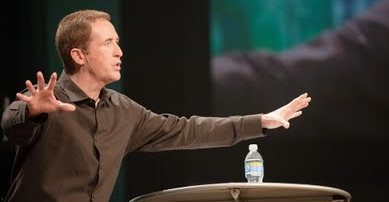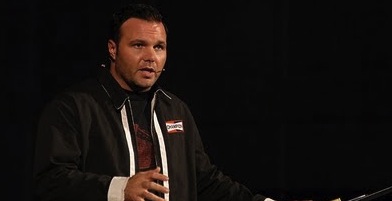I was recently watching the documentary Objectified, which is all about the design of everyday objects throughout our culture. Design is integrated into everything that we touch and see. From everyday objects that we think little about to the objects that we look at and are blown away by their design. Chairs, cooking tools, light switches, computers, phones, buildings, and so many more. Each item was designed by somebody. And the design of each item speaks to the one who designed it.
[tentblogger-youtube S9E2D2PaIcI]
"There's a story embedded in every object."
When you last picked up a fork and used it to eat your food, did you think about why it was designed that way? What's the story behind the fork? How did the fork end up the way it did and who decided that it should be the way it is? No matter what object you pick up, there's some kind of story behind it. There's a story of a designer, an object, and a problem to be solved.

"The object testifies to the people that conceived it, thought about it, developed it, manufactured it - ranging from issues of form, to material, to its architecture, to how it connects to you, how you touch it, how you hold it. Every object, intentional or not, speaks to who put it there." - Jonathan Ive, Designer for Apple in Objectified
In the same way everyday objects testify to the stories and people who designed them, our world testifies to the Creator God who crafted it. The universe testifies to the God who created everything. Humanity testifies to a God who designed men and women in his own image. In the Psalms scripture says, "The heavens declare the glory of God; the skies proclaim the work of his hands. Day after day they pour forth speech; night after night they reveal knowledge. They have no speech, they use no words; no sound is heard from them. Yet their voicegoes out into all the earth, their words to the ends of the world."
What kind of story does your life tell?
"Every object tells a story." - Henry Ford
If God is the great designer and every object tells a story, what is the story that your life tells? As you live your life, make your choices, and do life with those around you, what kind of story is being told about the one who designed you. Great design drives people to awe or even better it drives people to want what was designed. When people encounter you, are they in awe of what God is doing? Or better, do they want what you have?
Where do you see God's great design throughout our world?
Photo Credit: Alles-Schlumpf

 Throughout history God has used the spoken word to transform lives. Preaching has been an avenue that the holy spirit has worked through for thousands of years. Certainly over these years, many elements of preaching has changed. The context of the preaching is significantly different than it once was, yet at the same time many elements of preaching have held true over time.
Throughout history God has used the spoken word to transform lives. Preaching has been an avenue that the holy spirit has worked through for thousands of years. Certainly over these years, many elements of preaching has changed. The context of the preaching is significantly different than it once was, yet at the same time many elements of preaching have held true over time. This past weekend I got to be a part of the
This past weekend I got to be a part of the  Worship is an abstract concept. Worship is anything that we do in response to God for who he is and what we've done. While simple in statement, the reality is it can be a difficult thing to grasp. Despite it being difficult, not only do I think middle school students can grasp this, I think that often
Worship is an abstract concept. Worship is anything that we do in response to God for who he is and what we've done. While simple in statement, the reality is it can be a difficult thing to grasp. Despite it being difficult, not only do I think middle school students can grasp this, I think that often  Apple is one of my favorite companies that exists, and
Apple is one of my favorite companies that exists, and  Everywhere you look, somebody is using 3D to promote something. DVD players are 3D capable, television sets tout their 3D features, and even old movies are re-released as new 3D movies. 3D may be simply a fad, but regardless it is fun to have the capabilities to shoot a 3D video to show off. When we recently filmed some short 3D videos to help with our
Everywhere you look, somebody is using 3D to promote something. DVD players are 3D capable, television sets tout their 3D features, and even old movies are re-released as new 3D movies. 3D may be simply a fad, but regardless it is fun to have the capabilities to shoot a 3D video to show off. When we recently filmed some short 3D videos to help with our 
 Set both videos up in the timeline layered one on top of each other. You'll want to make sure that your videos are perfectly in sync and mute whichever audio is not needed.
Set both videos up in the timeline layered one on top of each other. You'll want to make sure that your videos are perfectly in sync and mute whichever audio is not needed.



